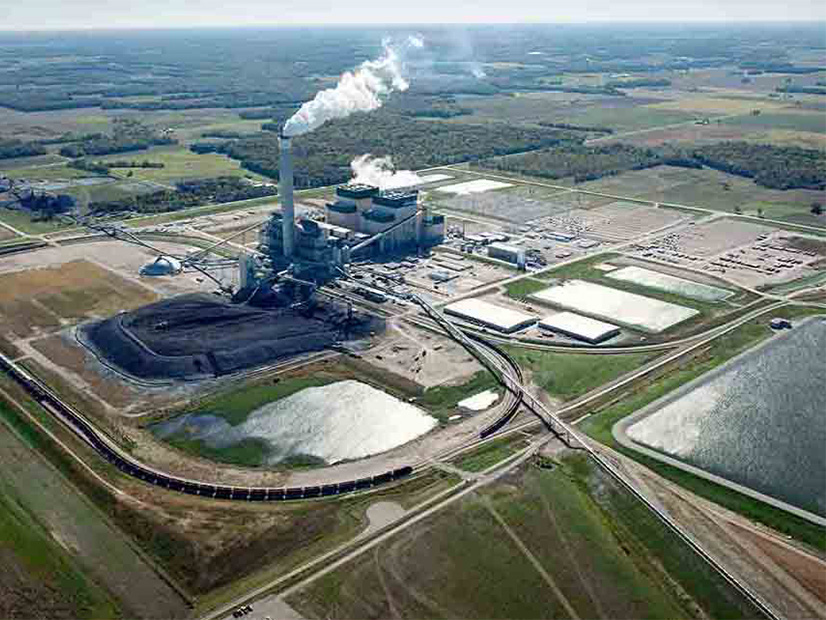
One of the largest power plants in Illinois has been running without proper permits since it went into service, the Sierra Club contends in a lawsuit filed Thursday.
As a major source of emissions, the Prairie State Energy Campus needs a Title V permit under the federal Clean Air Act, the environmental advocacy organization said, but has held only a Prevention of Significant Deterioration (PSD) permit since it went online in 2012.
The operator, Prairie State Generating Company, countered that the 1,600-MW plant is operating legally with the PSD issued by state regulators and called the Sierra Club’s lawsuit a politically motivated attempt to sidestep state regulations.
Under Illinois’ landmark 2021 Climate and Equitable Jobs Act, privately owned coal-fired power plants must shut down by 2030 but publicly owned plants such as Prairie State can run until 2045.
Megan Wachspress, the Sierra Club staff attorney who filed the lawsuit, said the action seeks a declaration that the plant cannot operate without a Title V permit.
Permit History
The Prairie State Energy Campus in Marissa, in southern Illinois, is owned by nine public power utilities and rural electric cooperatives. Coal mined on site is pulverized to powder and burned to run two 800-MW units that send electricity to customers in eight states.
It boasts of setting a new standard for clean coal production and of investing $1 billion in emissions controls.
The U.S. EPA’s ECHO database lists 2021 emissions of 8.2 million pounds of nitrogen oxides and 21.1 million pounds of sulfur dioxide. Both substances are potentially damaging to human health and the environment.
By state and federal statute, Wachspress said, these numbers make the facility a major source of pollutants and require it to hold a Title V Permit.
The Sierra Club’s lawsuit indicates Prairie State applied for such a permit — which is called a Clean Air Act Permit Program (CAAPP) in Illinois — in January 2010, updated the application in May 2011, and applied again in July 2020.
Neither of those applications was approved, Sierra Club writes.
Illinois regulators did issue a Construction Permit/PSD approval to Prairie State on March 30, 2012, Sierra Club said, but that’s not enough because the plant is a major emitter, and under state law Illinois’ failure to act on the CAAPP application constitutes a constructive denial.
Asked by NetZero Insider about the legality of Prairie State operating for a decade with a PSD, the EPA’s district office deferred to the Illinois Environmental Protection Agency, which declined comment.
Enforcement Sought
Wachspress could only speculate on how this went on for so long.
“This is such a fundamental requirement you just assume it’s being done,” she told NetZero Insider Thursday. “It’s disappointing that the Illinois EPA didn’t act on it.”
She said Prairie State has been on the Sierra Club’s radar for a while because of its huge output of harmful substances. The U.S. EPA’s Greenhouse Gas Reporting Program shows it to be by far the largest single source of CO2 emissions in Illinois in 2021, at 12.5 MMT.
There have also been a series of violations cited by the state and federal EPAs, Wachspress said.
After Prairie State was cited for exceeding federal limits on mercury emissions in 2021, Sierra Club began digging and discovered the lack of a CAAPP permit.
Sierra Club announced the lawsuit Wednesday. It was filed Thursday in U.S. District Court, southern Illinois.
Prairie State declined comment on the legal action itself but commented at length on the allegations at its root.
Vice President Alyssa Harre said via email that Prairie State “is operating legally under a Prevention of Significant Deterioration permit from the Illinois Environmental Protection Agency. To comply with this permit, Prairie State installed and has maintained more than $1 billion in state-of-the-art emissions control technology and continuous emissions monitoring system.
“This action by the Sierra Club’s California-based Environmental Law Program is a politically motivated attempt to circumvent the Illinois regulatory process, the consequences of which will bring instability to our electric grid to the detriment of the consumers we serve.
“Prairie State remains committed to working with the IEPA to maintain compliance with environmental regulations and will not let this lawsuit distract from our mission of providing value to the communities served through the continued production of reliable and affordable power, all while providing jobs and maintaining economic prosperity for hardworking men and women across downstate Illinois.”
The lawsuit is a citizen enforcement action, an attempt to force compliance with regulations that can be filed 60 days after the complainant gives notice of alleged violations to the parties involved.
Sierra Club said it gave such notice more than two months ago to EPA, IEPA and Prairie State.
Only Prairie State is named as a defendant in the lawsuit, which asks the court to:
- declare that Prairie State is violating the Clean Air Act and Illinois air regulations;
- enjoin Prairie State from operating the power plant until it obtains a CAAPP permit and is in compliance with the Clean Air Act;
- impose of civil penalties, and designate $100,000 for mitigating public health and environmental projects;
- order payment of Sierra Club’s legal costs.



